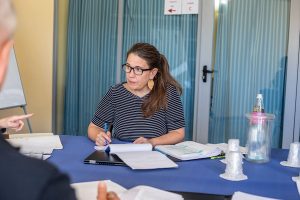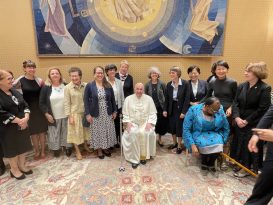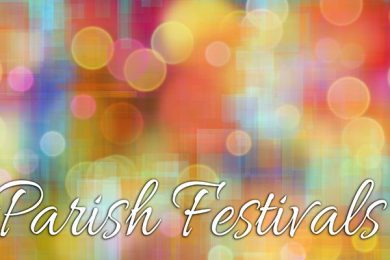Kristin Colberg is an associate professor of theology at St. John’s School of Theology and Seminary in Collegeville. She is the sole U.S. member of the international theological commission for the 2021-2024 worldwide synod with its theme “For a Synodal Church: Communion, Participation, and Mission.” This fall, she traveled to Frascati, Italy, where she was part of a 24-member group that spent 12 days in prayer, reflection and discussion while drafting the document for the synod’s continental phase. The document, “Enlarge the Space of Your Tent,” was released by the Vatican in late October. The following interview conducted by editor Joe Towalski was edited for length and clarity.
Q: You spent two weeks in the fall in Frascati, Italy, with a group synthesizing the document for the continental phase of the synod. Explain what the continental phase is and how it fits into the synod’s larger scope.

Colberg: I think the world Church had a really successful listening phase on the diocesan level. Of the 114 possible reports that could have been turned in by episcopal conferences around the world, there were 112. So the desire is to make the most use of what people said. What did the People of God say during this consultation about how they hear the Holy Spirit and what the Holy Spirit is calling the Church to today? What we did in Frascati was take these 112 reports and we prayerfully read them, discerned and tried to put into a document: “What did the People of God say?” “What did the listening Church hear?” What’s going to happen in the continental phase is that, gathering in seven continental groups, lay leaders and bishops and cardinals from these continents are going to reflect on this listening process.
Q: So all the continents are reading the same report. Everybody’s working from the same document.
Colberg: Everyone’s working from the same document. [But] then each continent will write another, second report, which will say, “Based on these meetings that we just held, here’s how our continent is going to provide somewhat of a response to that document.” … It’s really a discernment process. Those meetings will happen between February and March. Then I think by March 31 the continents have to each produce their own document. Then one document will come out of those seven, and that document will serve as the official working document for the October [World Synod of Bishops meeting].
Q: When you were having conversations in Frascati, did it strike you that a lot of the issues and situations people are facing around the world as Catholics are more similar than different?
Colberg: You’re touching on my biggest takeaway of the whole synod process, which is that I expected to read those 112 reports and feel like: How are we going to bring these together? … Whose concerns are going to get top billing? The amazing thing about these reports is how similar they are, how people want the same thing, how people love the Church and have similar struggles and similar joys. For me, a clear unifying thread among all these reports is a desire for more formation. Everyone in the Church says, “We could be more synodal, we could work better together, we could be stronger if there was more formation for lay people who want to share their gifts more.” Priests also need more formation; bishops need more formation.
A second line of commonality in all the reports was the desire to be a more welcoming Church. Everybody talked about the importance of striving for people to feel included. And, yes, when you talk to these people on a personal level, these 24 people I was meeting with, the same thing comes across — people love the Church deeply and see its strengths and its joys but are honest about places that it could be more authentically itself and more reflective of the ministry of Jesus.
One thing about this time in Frascati was that it was punctuated every day, multiple times, by prayer. It was a blend between an academic sharing of ideas, a reading of these texts, and lots of prayer. We would have these groups, and we followed this synodal format where everyone spoke once. We went around and everyone would speak for two minutes before anybody could say something twice. So we weren’t building on each other. One point wasn’t carrying the day because this person started first. But everybody would share, and then we’d be silent. So it’s clear to me that moving forward with synodality … is that it’s about a process. It’s not just about coming up with some perfect text at the end. It’s about having these experiences of listening, of prayerful discernment and working together.
Q: Pope Francis has added an extra year to the whole synod process. It’s now running into 2024. What’s your thought about what will happen during that extra time?
Colberg: Pope Francis really discerned that the process required more time. From what I have heard, adding an extra year is not adding a new step or something different or something more. It’s more of the same. The Vatican is calling it “two moments” in this last phase.

I think Pope Francis has realized that shaping people to engage in this kind of discernment and providing the space for it is time-consuming. We want on the universal level — which is going to include many bishops — to come together and be able to hear each other. One thing that some people have commented on is that, when you read some of these reports, sometimes you don’t hear the bishops’ voices and the priests’ voices as clearly, because perhaps there was a sense this was really a time for the laity to speak. But we need to hear the voices of priests and bishops. We need time for that.
In the diocesan phase, we had a group of people engaged in listening sessions, but it wasn’t everybody. Maybe when people read these reports or hear from a neighbor, or hear from someone else about this and the authenticity of this process, maybe another opportunity will bring them around and more people will participate.
When it comes to synodality … we’re not in this holding pattern waiting for the universal level meetings to happen to find out what comes next. In our Diocese of St. Cloud, David Fremo and his [diocesan synod] team have led such an amazing process that has taught us really important things about ourselves that we could act on now. We don’t have to wait for someone to come back and say, “Hey, you did a good job. Do these three things.” We should just live it now.
Q: In the U.S. we also have another big initiative with the National Eucharistic Revival. I hear people ask questions like, “Do these connect in any way?” “Does the synod have something it can offer to the revival as we move forward?” Do you think it does?
Colberg: I know the USCCB is really interested in this topic because we don’t want them to be parallel processes or “I was interested in one or the other.” They do go together. … I don’t want to speak too broadly, but the Eucharist is the source and summit of our life, and it is nourishment for the synodal journey. So how do we revitalize our interest and participation in the Eucharist as a way to know Christ deeply and come together as a community, and that makes possible our walking together and our desire to bring others in? … I think that it’s really important to see the Eucharistic Revival and the synod as going together as two major interrelated aspects of our journey, of our walking together, of our community.
Q: Is there anything more you would like to say about the synod process, synodality or your experiences with it so far?
Colberg: My message is always that the synod is a source of renewal and excitement. … I just think it’s amazing that the Catholic Church is involving lay people in this process to say, “This isn’t just academic theologians or bishops or people in Rome reflecting on this, but it’s really a synod of the whole Church.” Sometimes I think my students have been wanting the Catholic Church to ask them for years what they want, and here is that moment, where the Catholic Church is really asking us, “What is the Holy Spirit saying to you about what is needed in the Church in this time and this place?”
I’ll end with this. When you look at the U.S. report, it mentions this right up front: we experience polarization in the Church. We also sometimes experience disappointments in the Church. I think listening is an amazing step toward moving forward. Not only are we called to speak, but we’re called to listen. I just encourage people, despite maybe concerns or busyness, to get excited about the synod. We live in this unique historic moment in the Catholic Church’s life, and Pope Francis is calling us all to participate in it. I couldn’t think [of] any more cause for joy and excitement.
SYNOD UPDATES
For updates on the synod process and links to synod documents, including the continental document “Enlarge the Space of Your Tent,” visit the Diocese of St. Cloud’s synod webpage at www.stcdio.org/synod-2021-2024.






















